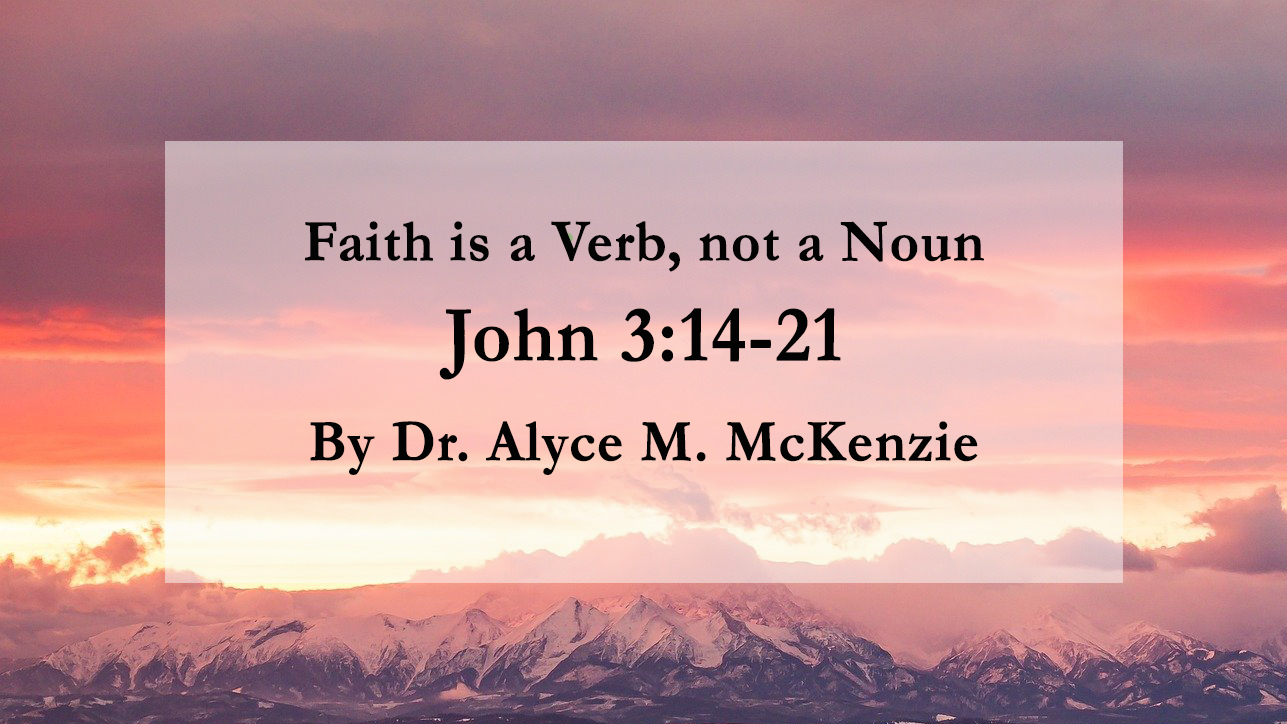Faith is a Verb, not a Noun - Reflections on John 3:14-21
by Dr. Alyce M. McKenzie on Monday, March 8, 2021

Lively Lectionary for Lent IV 2021 John 3:14-21
Faith is a Verb, Not a Noun
In his dialogue with Nicodemus in the 3rd chapter of John’s Gospel, Jesus says
“For God so loved the world that he gave his only Son, so that everyone who believes in him may not perish but may have eternal life.” (John 3:16)
In the Gospel of John belief is not intellectual assent, but wholehearted trust, entrusting our lives/futures to God. Faith in the gospel of John is a verb, not a noun.
- In contrast to the Synoptics and Paul, John's Gospel never uses the noun ("faith, belief") πίστις (pistis), but only the verb ("to believe; to trust"). πιστεύω (pisteuō),
- Believing is an action that one does, not an object or thing that one possesses; thus, the translation "believing" is better than "having faith."
- Since believing involves relationship, an even better translation in English would be "trusting" or "entrusting oneself to [God or Jesus]."
Saved (sozo) has the basic meaning of rescuing one from great peril. Additional nuances include to protect, keep alive, preserve life, deliver, heal, make whole. https://www.preceptaustin.org/save_sozo_greek_word_study
Robert Kysar, in his book Preaching John, elaborates on the theme of faith, not as intellectual assent, but as active trust.
There is no admonition to have faith in general. It is always faith in a particular object (God or Christ). The verb translated ‘to believe’ (pisteuō), is used 98 times in this Gospel, which suggests its importance. It means a personal trust in the sense that the believer trusts her or his life to Christ and to God, which means entrusting oneself to the revelation of God in Christ. That trust is what enables us to pass from the realm of the below and of the world to that which is not of this world and is above. It is the means to transition from phony self-understanding to authentic life- or what the Gosel calls ‘eternal life.’ Salvation in the fourth Gospel means above all allowing God’s revelation in Christ to determine our self-understanding.
(Robert Kysar, Preaching John (Minneapolis, MN: Augsburg Fortress Press, 2002), 62.
This insight suggests the sermonic theme of the difference between intellectual assent to Christianity and the existential act of actively entrusting our lives into the hands of God the sender of Jesus Christ. What kinds of life events might nudge us to make that move? And what might our changed lives look like? What impact might they have on our chaotic world?
